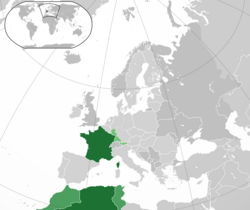Provisional Government of the French Republic
| Provisional Government of the French Republic | ||||||||||||||
| French Republic | ||||||||||||||
|
||||||||||||||
|
||||||||||||||
|
Motto "Liberté, Égalité, Fraternité" "Liberty, Equality, Fraternity" |
||||||||||||||
|
Anthem La Marseillaise The Song of Marseille |
||||||||||||||
|
||||||||||||||
| Capital |
Algiers (de facto, 3 June - 31 August 1944) Paris(de jure; de facto from 31 August 1944) |
|||||||||||||
| Languages | French | |||||||||||||
| Government | Provisional government | |||||||||||||
| Chairman of the Provisional Government | ||||||||||||||
| • | 3 June 1944 – 26 January 1946 | Charles de Gaulle | ||||||||||||
| • | 26 January 1946 - 24 June 1946 | Félix Gouin | ||||||||||||
| • | 24 June 1946 - 28 November 1946 | Georges Bidault | ||||||||||||
| • | 28 November 1946 – 16 December 1946 | Vincent Auriol | ||||||||||||
| • | 16 December 1946 – 16 January 1947 | Léon Blum | ||||||||||||
| Legislature | National Assembly | |||||||||||||
| Historical era | World War II | |||||||||||||
| • | Proclamation of the GPRF | 3 June 1944 | ||||||||||||
| • | Normandy landings | 6 June 1944 | ||||||||||||
| • | Provence landings | 15 August 1944 | ||||||||||||
| • | Liberation of Paris | 25 August 1944 | ||||||||||||
| • | Invasion of Germany | 19 March 1945 | ||||||||||||
| • | Capitulation of Germany | 8 May 1945 | ||||||||||||
| • | Admitted to the United Nations | 25 October 1945 | ||||||||||||
| • | Proclamation of the Fourth Republic | 27 October 1946 | ||||||||||||
| Currency | French franc | |||||||||||||
|
||||||||||||||
The Provisional Government of the French Republic (gouvernement provisoire de la République française or GPRF) was an interim government of Free France between 1944 and 1946 following the liberation of continental France after the operations Overlord and Dragoon, and lasted until the establishment of the French Fourth Republic. Its establishment marked the official restoration and re-establishment of a provisional French Republic assuring continuity with the defunct French Third Republic.
It succeeded the French Committee of National Liberation (CFLN), which had been the provisional government of France in the overseas territories and metropolitan parts of the country (Algeria and Corsica) that had been liberated by the Free French. As the wartime government of France in 1944-1945, its main purposes were to handle the aftermath of the occupation of France and continue to wage war against Germany as a major Ally.
Its principal mission beside the war was to prepare the ground for a new constitutional order that resulted in the Fourth Republic. It also made several important reforms and political decisions, such as granting women the right to vote, founding the École nationale d'administration, and laying the grounds of social security in France.
It was officially created by the CFLN on 3 June 1944, the day before Charles de Gaulle arrived in London from Algiers on Winston Churchill's invitation, and three days before D-Day. The CFLN itself had been created exactly one year earlier through the uniting of de Gaulle's (Comité national français, or CNF) and Henri Giraud's organisations. Among its most immediate concerns were to ensure that France did not come under allied military administration, preserving the sovereignty of France and freeing allied troops for fighting on the front.
...
Wikipedia



